Archive for November 2023
Visual Observing With A 6-inch f/6 Imaging Newtonian And Meeting All Expectations
November 17, 2023The optical tube assembly: Purchased from OPT (Ocean Pacific Telescope
6-inch OTA, f/6, with a 2-inch focuser, a 6 x 30 finder (I changed to an 8 x 50…later) and it also included tube rings, designed for a narrow-Vixen style dovetail. An excellent quality telescope in all aspects.
The original dovetail was too short for proper balancing, but I found a unique way to utilize. I flipped it over or upside down which made for a nice carrying handle and for setting up on the mount.

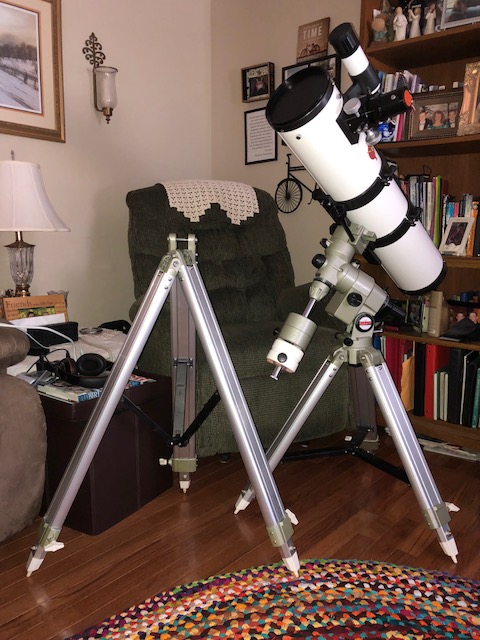
Shown with Vixen short tripod legs, for Newtonian’s, allowing for a seated position. Perfect for making pencil sketches. The longer tripod legs, are for my 102mm refractor.
To use with my Celestron CGE-Pro mount, I purchased a Losmandy wide-dovetail, and it works great.

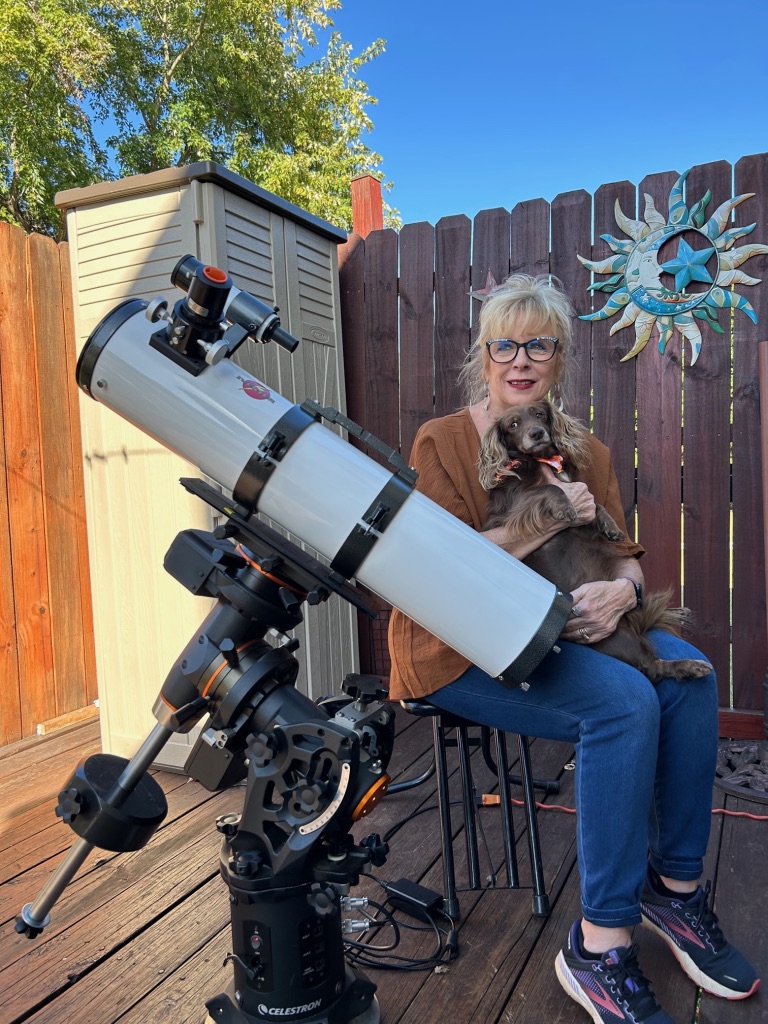
When I first became interested in amateur astronomy, during the late 60’s and 70’s, the 6-inch reflector was definitely the most popular telescope for the backyard observer.
The OPT Newtonian is a very nice quality and compact telescope, made in Taiwan. The mechanics and cosmetics are excellent with beautiful paint and a coat of clear to top it off.
When using a modest 32 mm (2-inch format) 65º apparent field eyepiece, the true-field is 2.2º with a magnification of 29x. I’ve found this to be an excellent combination for many larger, faint and diffuse deep-sky objects.
The Trapezium in Orion was a beautiful sight at 232x, including the fifth star, but averted vision was required. The F star could not be seen during several observations, on different nights.
10-inch Newtonian, which I’ve spent more than 3,000 hours at the eyepiece as following:
My 10-inch vintage Meade DS-10A, which has been my primary telescope for the past 30 plus years, but more about this later.

Galaxy IC 10 Cassiopeia: “The Invisible Galaxy” November 2023 Observer’s Challenge Report #178
November 13, 2023Roger Ivester: Observer from North Carolina
Telescope: 10-Inch f/4.5 EQ Newtonian
Sketch Magnification: 142x
FOV: 0.46
NELM: 4.8
So during the months of October and November 2023, three observing sessions and more than six-hours at the eyepiece, I was finally successful in seeing this galaxy.
So by own authority as an amateur astronomer, which is no authority, I’m naming this galaxy: “The Invisible Galaxy.”
A difficult and very faint low-surface brightness galaxy, using my 10-inch Newtonian. After three nights with poor transparency, and more than six-hours of observing I was finally about to make my final sketch, as following.
The first thing to look for is a triangle of three mag. 9 stars, with the galaxy being just to the N.
The galaxy appears as a mere brightening in the sky, but upon careful observing over the three nights, the glow of the galaxy halo became enlarged, and elongated NNW-SSE.
There is an extremely faint, and very subtle brightening in the middle. A faint star is visible near the center and a mag. 13 star is fairly easy to see just to the W.
In the following sketch, note the pair of faint and close double stars in the NW edge of the field.

Phil Orbanes: Observer from Massachusetts

Jaakko Saloranta: Observer from Finland
I remember IC 10 eluded my gaze for several years before I finally saw it by using my 8-inch telescope under rural Finnish skies. I tried to view it from my suburban backyard several times in the 90s but it simply was too faint.
Roger Ivester’s nickname “The Invisible Galaxy” is very fitting for this pesky little thing.
No structure seen. Sky conditions were quite favorable that night: temperatures in the 40s, only moderate humidity, naked eye limiting magnitude of 7.2 and some faint aurora borealis visible low in the northern sky.

Historic Building In Boiling Springs, NC: Originally Constructed As A General Store. Serving As A Post Office In the 1930’s, And Other Businesses To Follow. Most Recently A Museum, And Will Regain A New Life As A Coffee House
November 11, 2023
“You may have heard a rumor about Hannah’s expanding…and it’s true! We are opening a second location in downtown Boiling Springs. Our new Coffee House will be located at 109 S. Main Street in the historic building known as the Boiling Springs Museum. We Have been working closely with the Town of Boiling Springs staff and are proud to partner together on this exciting new venture.” Hannah
When Debbie and I heard this, we thought it would be good to document a little history concerning the building.
We had talked with Hannah at her Shelby Coffee House, earlier this year, and she shared with us, her hopes of having a coffee house in Boiling Springs.
Now more about the historic building, and some information about W.J. Cash from wikipedia: So Read on.…

Excerpts and photo of Cash via Wikipedia
Wilbur Joseph “Jack” Cash (May 2, 1900 – July 1, 1941) was an American journalist known for writing The Mind of the South (1941), a controversial and influential interpretation of the character and history of the American South.
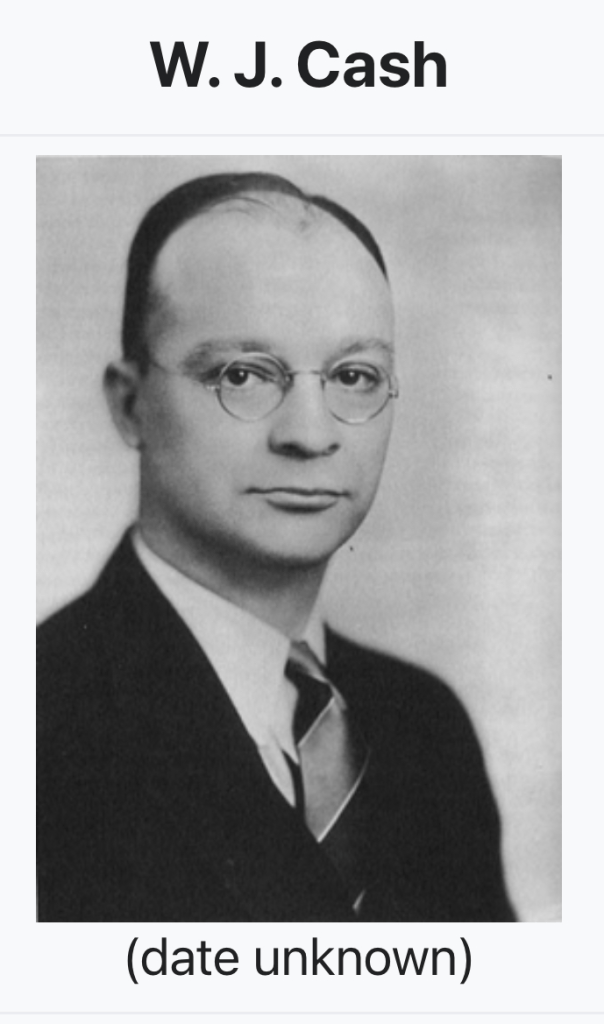
A protégé of H. L. Mencken and Alfred A. and Blanche Knopf, Cash suffered throughout his life from depression. He died by hanging himself shortly after the publication of the book.
Early life and education[edit]
Cash, known as “Jack” throughout his life, was born as “Joseph Wilbur Cash” – he later reversed the order of his given names, and normally used only the initials – and grew up in the mill village of Gaffney, South Carolina. His parents were Nanette Lutitia Hamrick, the organist at the local Baptist church who had previously taught music in the public school, and John William Cash, who managed the company store at the Limestone Mills. His ancestry was German and Scotch-Irish. He had three brothers and a sister, of whom he was the eldest. He was educated at the local public school until he was 12, when his family moved to Boiling Springs, North Carolina, 14 miles away across the state border – his mother’s home town – so that his father could become a partner with Cash’s maternal grandfather in a general store there.
Cash attended Boiling Springs High School, a Baptist academy, where his high school classmates called him “Sleepy”, due to his tendency to daydream. When he graduated from high school in April 1917, he gave the commencement address. Cash worked at his grandfather’s farm in the summers.
…..In 1918 and 1919, at his father’s wish, Cash attended Wofford College, a Methodist school, but left because he objected to the school’s narrow provincialism. He then enrolled in Valparaiso University, a Lutheran college in Valparaiso, Indiana, dropping out around Christmas 1919. In 1920, again at his father’s urging, he entered the Baptist school Wake Forest College, despite it being what he considered to be a “preacher college.”[2]
….during Cash’s final two undergraduate years, he served first as Managing Editor and then Associate Editor of the college newspaper, the Old Gold & Black, where he emulated H. L. Mencken‘s style of writing. In his editorials, he opposed the state’s Baptist newspaper The Biblical Recorder on issues such as evolution and social dancing. In the summer, he worked at the hosiery mill at which his father was then the superintendent. Cash graduated in 1922 with an A.B., and then attended law school there for a year, before deciding not to pursue a legal career.[2] Cash later declared that he left law school because it “required too much mendacity.”
…..Cash taught English at Georgetown College in Georgetown, Kentucky, and at a high school in North Carolina, before experiencing a nervous collapse. Throughout his life, Cash suffered from manic depression or affective disorder, which manifested itself in breakdowns, periods of depression, fear of sexual impotency, and physical ailments such as not being able to swallow or choking when he spoke. He also suffered from a hyperthyroid condition, occasional alcoholism and excessive smoking. Cash usually referred to his condition as “neurasthenia“.[7]
After his breakdown, at great strain on their finances, Cash’s parents paid for him to take a bicycle tour of Europe –through England, France, Italy, Switzerland, Germany, and Belgium – during which he recovered.[6][2] When he came back he turned permanently to journalism as his profession.
Newspaper career[edit]
From 1926 to 1928, Cash held several newspaper jobs: a year in Chicago writing for the now-defunct Chicago Evening Post; several months with The Charlotte News during which he wrote a wistful philosophical column titled “The Moving Row”; and a four-month stint during the fall of 1928 as the chief editor of a small semi-weekly newspaper, the Cleveland (County) Press, in Shelby, North Carolina.
…..Afterwards, Cash moved back into his parents’ house in Boiling Springs – where he lived with his extended family, including his two brothers and their pregnant wives – and became a freelance journalist, not easy to do in a busy and noisy household.[8] He contributed to H. L. Mencken‘s The American Mercury magazine, and received encouragement from Mencken. From 1929 to 1935, Cash wrote eight articles about various aspects of the South,[a] including one in October 1929 called “The Mind of the South”, which would become the basis for the later book.[b]
During the period of primary writing on The Mind of the South (1929 to 1937), Cash continued to live with his parents in Boiling Springs.[9] When his contributions to The American Mercury ended after Lawrence Spivak took over ownership of the magazine, Cash supported himself with freelance weekly book reviews to The Charlotte News from 1935 to 1939, for each of which he received a payment of $3, equivalent to about $60-$65 in 2023.[10] The “book reviews” often became fierce analytical diatribes penetrating the mindset of Nazism under Hitler and Fascism under Mussolini. Cash also wrote occasional editorials for the paper focusing primarily on the danger of Hitler and Mussolini to worldwide democracy, a topic on which he regularly expounded from 1935 and by the late 1930s would overtake his interest in the South and further delay completion of the book.
Cash was nominated for a Pulitzer Prize for Editorial Writing in 1941 for his work during 1940 on World War II for the newspaper.
The Mind of the South[edit]
Cash’s seminal article, “The Mind of the South”, was published in The American Mercury in October 1929. The aggressive style of the article was heavily influenced by that of Mencken,[12] as Cash had yet to develop his own distinctive voice, but on the basis of the article, and Mencken’s enthusiasm for Cash, Blanche Knopf, the wife and partner of the magazine’s publisher, Alfred A. Knopf of New York, invited Cash to submit a plan or manuscript for a book-length expansion of the article. In April 1930, with the help of University of North Carolina sociologist Howard W. Odum, Cash submitted a sketch of the proposed book, on the basis of which the Knopfs offered Cash a contract. Over the next 10 years, as Cash worked on the book, the Knopfs – who were known for their sharp instincts about up-and-coming writers – provided both encouragement and small monetary advances to keep him going. Shortly after he had submitted the sketch of The Mind of the South to the Knopfs, Cash had a physical collapse which prevented him from writing for two years, under doctors’ orders to stop writing and get more outdoor exercise.
In 1932, however, he began to write seriously again, using the unheated back room of the Boiling Springs Post Office, where his aunt was the postmistress.
A perfectionist, he discarded more pages then he kept, but made progress; he also continued to do free-lance writing, despite his poor health, his lack of money, and his significant writer’s blocks.
After Cash had some success at The Charlotte News, he finally had the personal and professional confidence he had previously lacked, and his work there helped him to develop his unique style of writing. He also met and fell in love with Mary Bagley Ross Northrup (later known as Mary Maury), a divorced woman who also wrote for the paper, and who helped him to complete the book through his periods of depression,[11] and his continued focus on events in Europe. During this period, Cash would listen to the news on the radio about the Anschluss with Austria, the invasion of Poland, or the fall of France and would pace around the room, biting his nails, hands, and wrists, leaving marks. He would become so upset that he would leave the house and walk the streets at night.[14]
Finally, on July 27, 1940, the last pages of the manuscript were finished and sent to New York. Five months later, on Christmas Eve, Cash and Northrup were married by a justice of the peace in York, South Carolina.[11][2]
On February 10, 1941, The Mind of the South was published by Knopf. The book, an intuitive socio-historical exploration of Southern culture, received wide critical acclaim at the time and garnered for Cash praise from such sources as Time, The New York Times, The Saturday Review of Literature, and most Southern newspapers of note, although criticism came from the Agrarian group out of Vanderbilt University in Nashville. Cash also received the thanks of Walter White, the director of the NAACP, for the book’s liberalism in regard to race and its exposure of the bigotry of the South.[15] Time said of The Mind of the South “Anything written about the South henceforth must start where [Cash] leaves off.”
In Mexico[edit]
In March 1941, largely on the strength of the critical success of the book, Cash was awarded a Guggenheim Fellowship, which included a small stipend which would allow him to spend a year writing a novel about the progress of three generations of a Southern cotton mill family, like his own, from the Old South into the modern era.[16] Cash had always considered himself to be superior at writing fiction to non-fiction, as he stated in his October, 1940 application to the Guggenheim Foundation, and so he embraced with great eagerness the opportunity to try his hand at a novel for a year.
Cash and his wife chose Mexico to spend their year on the Fellowship because it was cheap to live there, and they would have to watch every penny; they embarked on their trip to Mexico City on May 30 1941.[2] Cash had been invited by University of Texas president Homer Rainey to provide the main commencement address to the 1941 graduating class on June 2 in Austin, Texas. Cash addressed some 1,400 graduates on “The South in a Changing World”, focusing on the main developmental socio-psychological themes of the South through history into the modern era.[c]
While in Mexico City, Cash came under an apparent psychotic delusion. On June 30, he told his wife that he heard Nazi assassins whispering in the next room, plotting to kill him. The next day, when he was calmer, she went to get help. On her return with a correspondent they had met earlier, Cash was not in the room. Hours later, he was located in another hotel, the Hotel Reforma, where he had hanged himself with his tie from the bathroom door.[17][d] An autopsy failed to find evidence of a brain tumor. Cash’s remains were cremated, and a funeral service was held in the First Baptist Church in Shelby. The ashes were later envaulted in Sunset Cemetery in Shelby.[2]

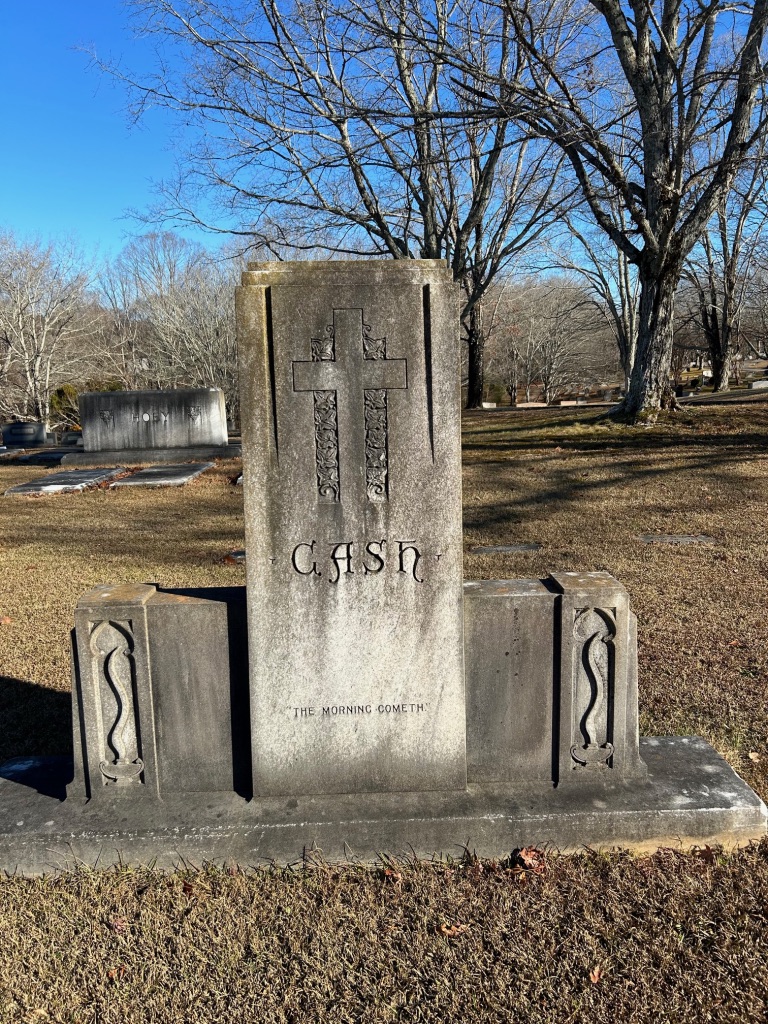
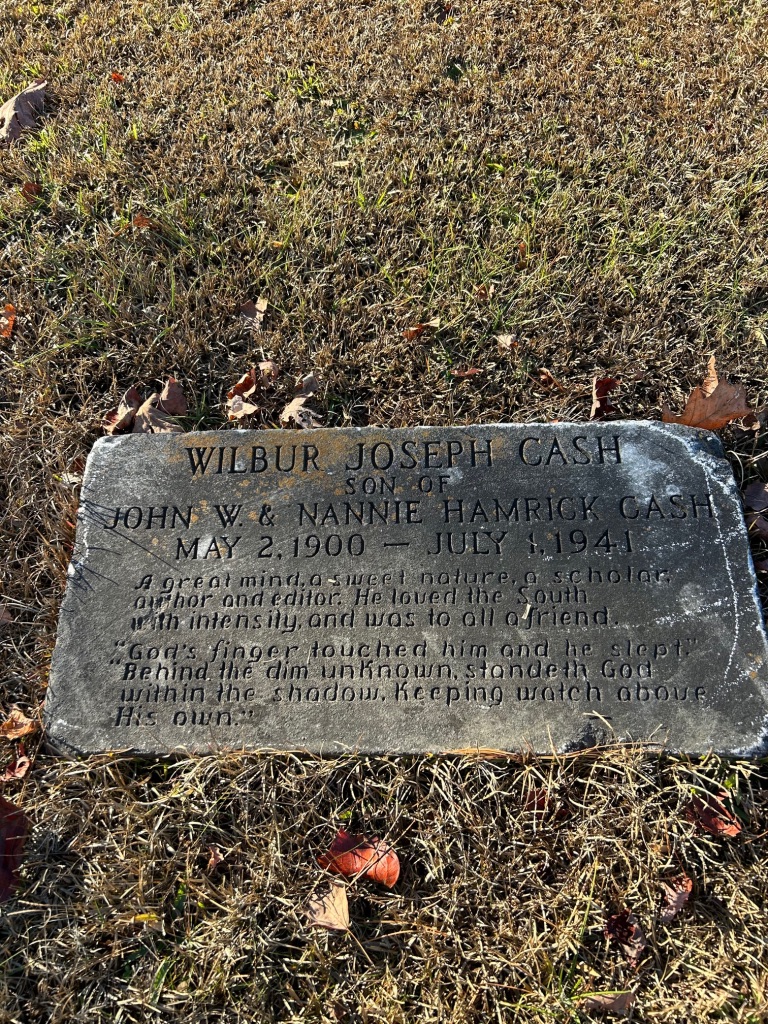
Recent Comments